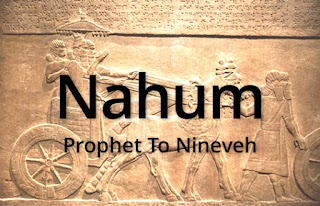Before we make predictions as to what the Almighty will do, or worse, tell Him how He should act, let us remember that God always has the bigger picture and the longer view
(Please start by reading Jonah 4)
 |
| Source: Grace Fellowship |
Jonah had run away rather than betray his people, had been thrown overboard and drowned in the Mediterranean, brought back to life inside a sea creature, and still had to walk 500 miles to pronounce a few words to an undeserving enemy who became the recipient of God’s mercy. Back home his world view was that the God of Israel should only have dealings with that chosen race. Now he is angry with God who is slow to anger, who has relented from deserved disaster for a foreign people who will bring murder and mayhem to his own kin. And now he moans at God with that other common human utterance: ‘I told you so!’
Jonah 4 is full of questions; in fact, this is the only book in the Bible that finishes with a question. Twice God asks Jonah if he is right, or perhaps has the right, to be angry, first over the city being spared, and secondly over the withered plant that had shaded him. The narrative throughout the book makes is clear that nothing happened by chance. God sent the storm that threatened the ship, God appointed the fish, God made the castor oil plant grow, then appointed a worm to attack it, and God appointed a scorching east wind to make poor Jonah yet more uncomfortable.
But perhaps it was God’s questions that made Jonah the most uncomfortable. Is his anger justified? Can a man challenge God’s actions? Jonah would have rather the city be destroyed, and the plant live, but the Lord was showing a better way, reversing human presumption. Jonah thought he knew about God’s nature, but God was bringing him to a more personal relationship, and that was going to be a painful process. In Paul’s letter to the Romans, he debates the question of election: Roman 9:14-16 ‘What shall we say then? Is there injustice on God's part? By no means! For he says to Moses, ‘I will have mercy on whom I have mercy, and I will have compassion on whom I have compassion’. So then it depends not on human will or exertion, but on God, who has mercy’.
 |
| Source:Pinterest |
God was giving an opportunity to those who had lost their moral compass. Today we should take this to heart. Like Jonah we can be zealous for God’s name and reputation but fail to understand His heart of compassion and the length of His patience. Before we make predictions as to what the Almighty will do, or worse, tell Him how He should act, let us remember that God always has the bigger picture and the longer view.
Indeed, life as we know it is not fair, but one day Jesus will return and make everything right. There will be a Day of Judgement, but today He offers compassion and mercy to those who turn in repentance, having Himself paid for our wrongdoings. We should never resent other people’s blessings, even if we think they don’t deserve it - that’s their story. Having received mercy, let us practise mercy; James 2:13 ‘For judgement is without mercy to one who has shown no mercy. Mercy triumphs over judgement’.
Be blessed.
Author: John Plumb
May God bless and enrich your life
Please feel free to share this article and other articles on this site with friends, family and others
A historical footnote:
It seems that Jonah never made it home. The revered tomb of ‘Nabi Yunus’ is in Nineveh, on the outskirts of Mosul. It must have some significance because in 2014 followers of ISIS blew it up.






